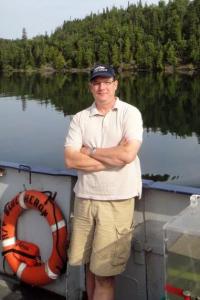Saturday May 26th, 2018
Social Hour 7:00pm Program 8:00pm
Madeline Island Museum
$30.00/person, open to the public
RSVP by May 21st: Ned Hancock ktwj@aol.com
(Maximum 100 guests)
An evening reception with an informal buffet of elegant and hearty hors d'oeuvres, choice wine service, and coffee/tea and assorted desserts. Social gathering and food service begins at 7:00pm, with the program beginning at 8:00pm.
Speaker:
Dr. Robert Sterner
Director, Large Lakes Observatory
University of Minnesota Duluth
Did you know that only five lakes hold more than half of Earth’s liquid, surface freshwater? These gigantic and amazing ecosystems are simultaneously awe-inspiring, valuable, and threatened. In this talk Dr. Robert Sterner from the Large Lakes Observatory, University of Minnesota Duluth will consider how human action has altered these environments, how we value the water they contain, and what responsibilities come with our region being “water rich.” He will take us on a virtual tour to some of Earth’s largest lakes — the focus of attention at the Large Lakes Observatory.
Large Lakes Observatory
Researching Biology, Chemistry, Ecology, Limnology, and Stoichiometry of Earth's Largest Lakes
Dr. Robert Sterner
“Less than one percent of Earth’s water is fresh, liquid, and accessible, and most of that is found in huge lakes scattered around the globe. The Large Lakes Observatory expands and communicates knowledge about the past, present and future of large lakes worldwide, where most of the water depended upon by human society is found.
It is somewhat shocking to realize that only 5 lakes contain 1/2 of Earth’s surface, liquid freshwater. I have been fascinated with Earth’s largest lakes from the time I first started studying limnology. As my career has evolved, these fascinating and immensely valuable places have become a greater and greater preoccupation. Today I am privileged to lead the Large Lakes Observatory at the University of Minnesota Duluth, which is the only institution on the planet with a mission to perform scientific studies of Earth’s largest lakes.
Limnology is the science of inland waters. It is a multidisciplinary field, with physics, biology, chemistry, geology, social sciences, and others all strongly contributing to the understanding of the whole. True to this spirit, work in my lab has covered a wide range of topics, but the center of gravity of all these is the field of Ecological Stoichiometry, which in simple terms is the study of how the nutrient content of organisms shapes their ecology. My lab colleagues and I get involved in many topics but almost always there is some big or little bit of stoichiometry in them. The link between nutrients and organisms is important for both theoretical and practical reasons, simply put, society has a lot of water quality problems that stem from how nutrients affect organisms, and we research fundamental questions in that arena. ”




















